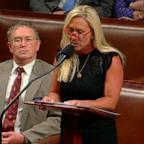Book says inflation rates of 1970s could return
— -- As Americans confront the most threatening economic conditions in nearly a century, gloomy comparisons to the 1930s Great Depression are rife. But a more recent episode of economic dysfunction also may offer lessons as the country tries to regain prosperity.
In The Great Inflation and Its Aftermath, author Robert Samuelson turns to what he calls an underappreciated watershed in U.S. economic history: the spiraling prices of the 1970s and the painful national belt-tightening that eventually quelled them.
Samuelson, a longtime columnist for Newsweek and The Washington Post, rightly describes the era as worthy of renewed attention. After the sunny growth of the 1960s, inflation suddenly spiked to double digits and stayed there for three consecutive years: 1979, 1980 and 1981. It reached an annual high of 13.5% in 1980.
The standard explanation for rising prices identifies as the culprit Lyndon Johnson's bid to have both the guns of Vietnam and the butter of the war on poverty without raising taxes. Samuelson instead blames a generation of depression-scarred economists who shared an "obsession" with obtaining full employment and the hubris to think such a utopian state was attainable.
Samuelson doesn't say so explicitly, but there is an obvious parallel between the unintended inflationary consequences of the full employment campaign and the foreign policy mistakes that led to Vietnam. In both instances, an establishment consensus to avoid repeating searing historical experiences led to disaster.
In foreign affairs, "the best and the brightest," with memories of the appeasement of Hitler still fresh, were determined to confront in Southeast Asia what they saw as another expansionist ideology. Likewise, the postwar economic elite had learned too well the lessons of the Great Depression and in trying to eradicate joblessness stumbled into uncontrolled price increases, Samuelson says.
The message for today: Beware overly confident government officials in possession of powerful policy remedies that "everyone" supports. Samuelson's warning is worth remembering as a new U.S. administration readies a sweeping and expensive economic recovery plan.




